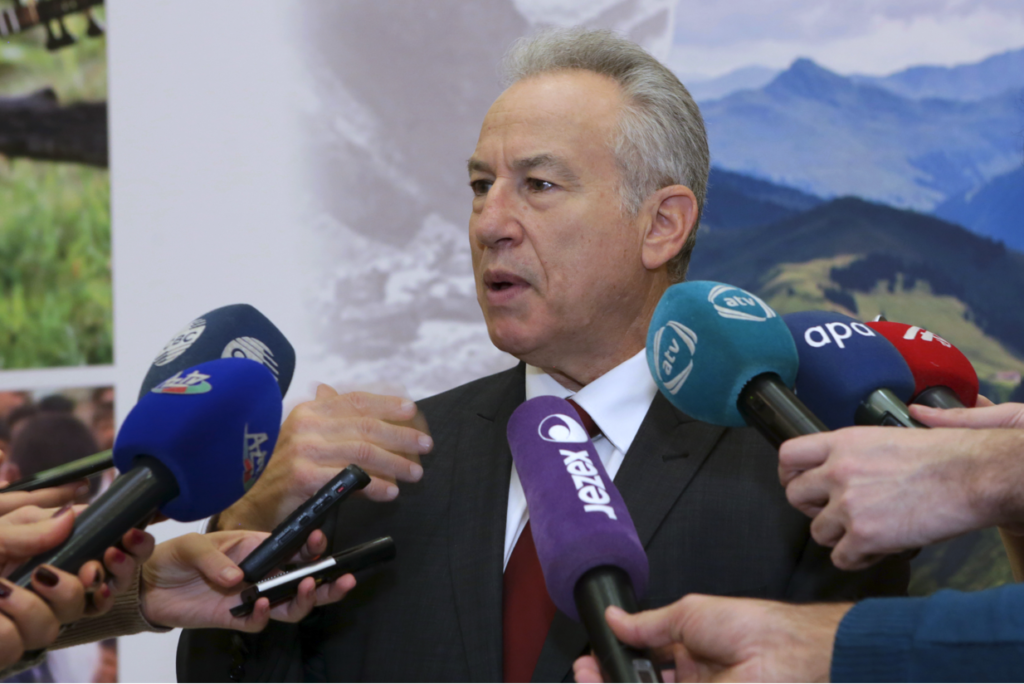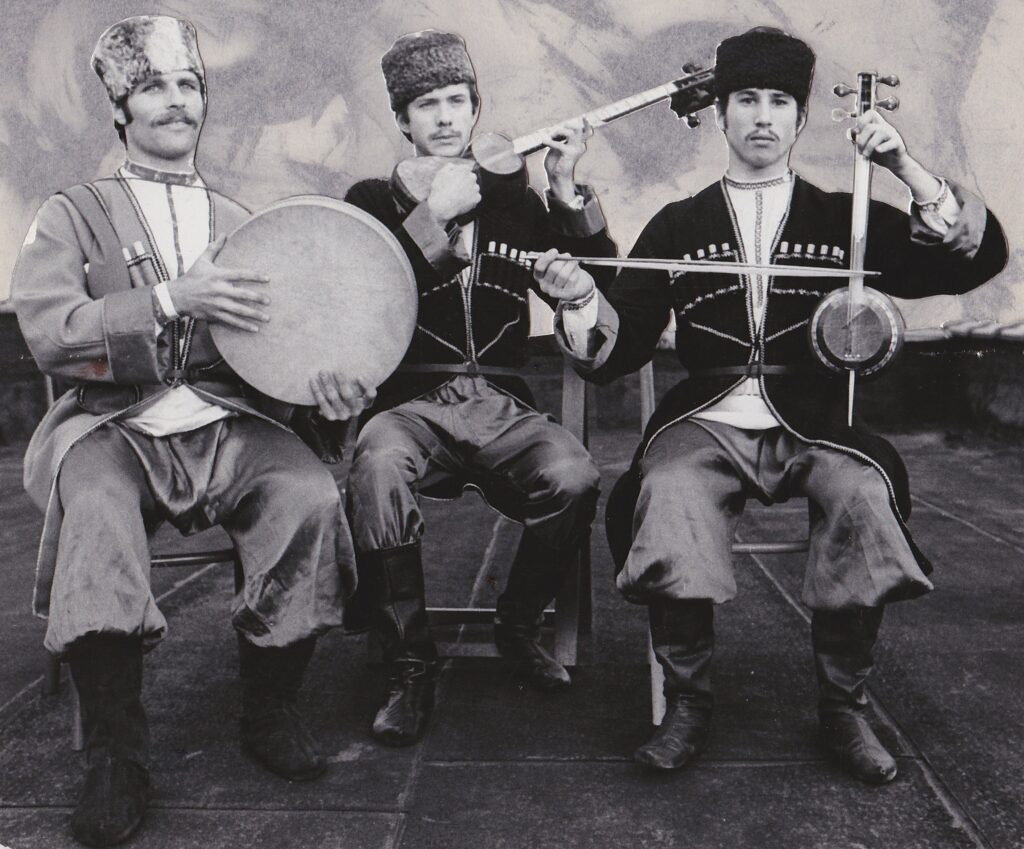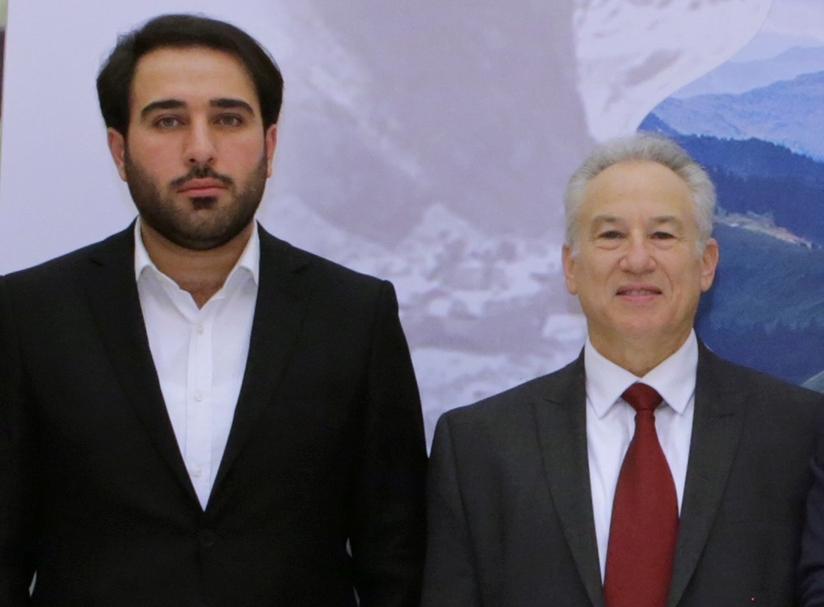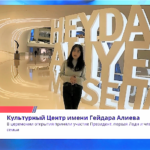There can be no other explanation of mugham except as a miracle
Our editorial team represented by Fatma Hajiyeva (10A1) and Samir Javadov managed to meet online with Mr. Jeffrey Werbock. Initially it was planned as an interview, but it turned to very interesting and sincere talk. Read and make yourself also inspired by this extraordinary and talented person

Mr. Samir: We all have watched your film “Young Voices, Ancient Song” and we are impressed by this film. Especially students, they enjoyed this film very much. I talked about you as you are in love with Azerbaijan. When I listen to mugham, I can clearly understand if the person plays as he or she learned or from the bottom of the heart. From the first moment, I understood that you play mugham from the heart. Because you can’t play mugham without feeling it from the heart. Mugham is the music, you are not playing, you are narrating. Each mugham is a story, the player is the storyteller. Now, I will give the floor to Fatma.
Fatma: First of all, I would like to thank you for accepting our proposal and spending your precious time with us. Meeting you is a pleasure for me. Approximately 3 days ago, I was watching TV and suddenly saw your documentary movie ‘’Young Voices, Ancient Song’’. It seemed very interesting to me and I kept watching. At the end of the movie, I started crying unconsciously. This movie impacted me so deeply. After the movie, I searched for some information about you. And 2 days ago, I was told that I will be supposed to take an interview with you. You can’t imagine how happy I was! Firstly, I want to thank you Mr. Samir for giving me this opportunity. Let’s start the interview.
Jeffrey Werbock: Samir is quite right. First, we must learn the classical form of mugham, as it is taught in the conservatory. But I live in the United States, we don’t have a mugham conservatory here, not yet, maybe someday we will. In year 2000, I was lucky to find a kamancha player living in Brooklyn who had graduated from the conservatory in Baku. He taught me the classical form of mugham. When you are playing in a group, you must play mugham in a predictable fashion, especially when you are supporting a singer, khanende. In the USA, I play solo so I can improvise more. Also, I am playing for students and professors in colleges and universities, not mugham experts, so I have more freedom when improvising mugham melodies. I can express the essentials of mugham freely and easily. In addition to kamancha I also play on tar and oud, to vary the program. I also taught myself how to play mugham on electric guitar. There are significant differences between tar and guitar. They both have their own sweetness. That I play four different string instruments helps me to develop more improvisational styles. I had 3 teachers for kamancha and 3 teachers for tar, so I learned 6 different ways to render mugham. They each had their own unique ways to play mugham. Whenever you listen to anyone’s interpretation, you can hear the core structure behind their interpretation
Fatma: Why have you chosen mugham among the other music fields?
Jeffrey Werbock: I feel I didn’t choose mugham, I feel as if Mugham chose me. Why me? I have no idea. The first time I heard Azerbaijani mugham was on kamancha played by an old man who was originally from Daghestan. I met him in the USA in 1972 and I was so deeply moved by what he did with his kamancha. I didn’t know it at the time but his version of mugham was very simple. I was so impressed by his power. When I began to learn from him, he told me he was the last living carrier practitioner of this great and ancient tradition so I felt obligated to learn from him; this might even be my responsibility. And I wasn’t sure if I could learn to be able to play like him or not. After associating with him for about 12 years he left the country, and three years later he passed away which deeply saddened me; he was not only my first mugham teacher, he was also something of a father figure to me. My Azerbaijani friends in New York advised me to go to Baku, saying mugham is alive in Azerbaijan and I could find another teacher. By then I realized my first teacher was not the only carrier practitioner of this tradition as he claimed, but I still felt I had to understand mugham in all its complexity. That’s why I took some lessons from several Azerbaijani musicians who had visited the USA during this time, and why I went to Baku to find teachers, to understand their styles and techniques better.
Fatma: We know you can speak the Azerbaijani language; how did you learn?
Jeffrey Werbock: When I first came to Azerbaijan in 1989, I was invited by the Friendship Society, a government 32 33 agency responsible for inviting foreigners. I couldn’t speak Azerbaijani yet so there were 2 translators for me. I wanted to speak Azerbaijani because I knew I was going to visit Azerbaijan again, perhaps many times. There were no teachers here so I had to teach myself, even without a dictionary. But I managed to learn the language quickly because I enjoyed it so much. After a few years, I was speaking Azerbaijani not too badly. It’s a good thing since I did have a meeting with your great leader Heydar Aliyev in 1997 who had a most impressive personality. It was a great honor and a pleasure to meet with him. We spoke for more than a half an hour; he gave his time to meet with me even though he had important meetings on the same day. I had to learn the Azerbaijani language. It is really useful because, during the making of the film, we traveled to the regions of Azerbaijan. I didn’t have a translator during this period but I didn’t need one. It was also helpful when I studied mugham from the kamancha player who came to Brooklyn as he did not speak English yet. In learning music, it is better to be able to converse but not necessary. We don’t have to learn a language for playing mugham. I had some students in America, one is Azerbaijani, Azer Demirov, who plays the violin. I taught him Bayati Shiraz. We both speak English and Azeri but we didn’t need to discuss much; I would show a phrase and he would repeat it. And I also taught several American students how to play mugham. They didn’t need to learn Azerbaijani, they just listened to me very carefully and learned mugham’s structure and texture. I hope one day I will bring them to Azerbaijan when traveling restrictions are lifted. They will be able to demonstrate their skills in mugham.
Fatma: We recognized Nizami Pashayev thanks to your documentary movie. His singing grieved all of us. When was your last meeting with him? Are you still in contact?
Jeffrey Werbock: We met last in Azerbaijan in 2016. Our story is told in the movie. When we first met in one of the refugee camps in 2000, he was only 14 years old yet his singing was extraordinarily emotional. He sang “Haqqimiz yox danishmaga daglardan, azad elemesek yagilardan”. When I edited the videos we made during that expedition, I watched him sing many times. We say in Azerbaijani, “Tüklərim biz-biz durub”. We can’t expect these emotions from a 14-year-old boy, it was shocking for everyone. Mugham is so deep, so complex. How do your children do these miracles? It is really “mocuze”. We are not talking about a couple of children, perhaps prodigies; there seems to be hundreds of children who have the ability to sing mugham at a very high level of quality. I am an adult but I can’t sing like these children. We returned to the camps after 8 years to find him again. We did find him but he doesn’t sing anymore, very sad. In 2016 we met again in the Nizami theatre when there was an event for our movie. I also met with Elnur Mahrammov who was a refugee from Aghdam and who served as our guide in the villages and camps. One of the children singers from the filming in 2008 I am still in contact with; Asker Askerzade, whose parents were refugees from Aghdam, now living nearby in Quzanli. He was only 12 years old at the time (2008), singing Qarabagh Shikestesi and mugham Segah. We ended the film with that scene because of the positivity of the message that the new generation must carry this tradition to future generations. Asker continued to singing after becoming an adult. I invited him to the USA where we performed 2 times, once at University of Pennsylvania in Philadelphia, and once in Princeton University in New Jersey, both very prestigious venues. Now we are planning to do more collaborations and I hope one day we will perform in Aghdam and Shusha.
Fatma: What other influences helped to shape the way you play mugham today? What does mugham mean to you, since you did not grow up listening to this kind of music?
Jeffrey Werbock: In addition to the musicians who play on Azerbaijani instruments, there are many who play on western instruments and I listen to them too. Each instrument invites us to play mugham in unique ways and they all contributed to my way of playing mugham. Regarding my feelings about mugham music in general, there is a difference between your approach and my approach. Your parents and grandparents listened to mugham, but mine didn’t. I was 21 years old when I first heard mugham. For many Azerbaijanis, mugham can evoke a kind of patriotic feeling, pride in one’s ethnic heritage which of course does not apply to us foreigners who happen to love your mugham. I also hear from Azerbaijanis they feel a deep sadness from mugham, but when I play mugham, I feel none of that, I feel joyous. Of course there is a bit of sorrow in mugham music but for me there is mostly joy. I see joy on the faces of Azerbaijanis when they listen to mugham but for some reason they emphasize the sadness when they talk about their feelings.
Fatma: Surely you know about our history and you know about Karabakh. Do you want to share with us any thoughts about that?
Jeffrey Werbock: Often I am asked questions about the situation in Karabakh. I don’t have the right to comment, because I am just a musician, not a politician or historian. Whatever the Azerbaijani people want, I want them to have that. When Azerbaijani people are happy, I am happy. We all suffered from this occupation. I remember like yesterday when Kalbajar was newly occupied. I tried to explain this to people in my country, but they only read propaganda that Azerbaijan was the aggressor country, not Armenia. They didn’t know the reality. Eventually officials in the State Department of USA understood the truth for themselves. During those times, there were very few Azerbaijanis in USA from Baku side. I just had one friend who was from Baku. Except for him, all of my Azerbaijani friends were from Iran and were mostly students and professors in American universities. When I asked them about Karabakh, they said “This is not our problem”. It was just shocking for me, and disappointing. They were focused on the problem of publicly speaking the Azerbaijani language in Iran, because 30 years ago it was dangerous. But now, they think about Karabakh, they are proud of this, because Azerbaijan got its lands back.
Fatma: If there would be mugham festivals in Shusha, would you like to participate?
Jeffrey Werbock: Yes, I absolutely would like to! In 1997, meeting with Heydar Aliyev, he asked me, ”Is there anything we can do for you?”. And I said, “When you get Shusha back, I want to help build a mugham school there.” I explained that I was an engineer and know how buildings are built. And he said, surprised, ”Shusha?” Shusha is known as the cultural capital of Karabakh. And Karabakh is known to be the birthplace of mugham. So we are waiting for the Azerbaijani government to rebuild those places in Karabakh, especially Shusha, so, we can come and visit. And we want to promote tourism there; all people must come and see this miracle in the Caucasus.
Fatma: You are absolutely right! Next question is, which musicians are you inspired by in Azerbaijan?
Jeff: They all are inspiring for me, they all are amazing. Everybody in the Milli conservatory, in Asef Zeynalli mugham school, Ince Senet Universiteti, they are all my brothers and sisters. Even the wedding musicians, they all inspire me, they are all great musicians and they know mugham so well.
Mr. Samir: I can recommend you to listen to Vafa Orujova. She participated in the mugham competition approximately 7 years ago. You will probably like her singing. Because she sings from the bottom of the heart. Especially Bayati Shiraz she sings super!
Jeff: InshAllah we are going to sing and play Bayati Shiraz in Shusha!
All: InshAllah!
Mr. Samir: I want to ask Mr. Jeffrey’s this question. We have mainly three instruments in mugham which are kamancha, tar, and ud. In my feeling, kamancha is crying, tar is telling, the voice of ud is like mystical. Do you agree with me?
Jeff: I can agree with you on one point. If kamancha is in the right hands, it can tell or it can cry, and it’s sound is more mystical than any other instrument. The sound of kamancha is really a miracle. I remember that first time when I listened to mugham Shur on kamancha. It was just amazing. I can’t understand, why doesn’t the World know about mugham, this miracle? Why just me, not other musicians? You have this power and also your children have it. There can be no other explanation of mugham except as a miracle. I am 69 years old and I have never seen a miracle, except in Azerbaijan. That is why I made a film to show to the whole world how your children sing mugham. This was not easy. It was expensive to make this film. But we were very lucky, we found a young businessman, Tale Heydarov agreed to produce it. And he didn’t want to show his name, he didn’t want people to think he is trying to promote himself, gain favor, or anything. I said, “Yes, good, but the name of the producer must be in the film credits, you have got to tolerate this”. He is extremely modest.
And we are going to make another film too. He called me 7 weeks ago and said “Jeffrey, are you ready to go back to Azerbaijan?’’. And I said, “As soon as traveling restrictions are lifted, yes why not?”. He said, “We want to go to Shusha”. At that time Shusha had not yet been liberated. And I said, ”What do you mean Shusha, it is occupied”. And he said, “Soon it will be ours”. I just said, ”I want to go to Shusha!’’ And approximately one week later, he called me that Shusha is liberated! You can’t imagine my reaction. Finally after waiting patiently all these years we are going to make kabab and sing “Shushanin Daghlari”. After 30 years, you got back your homeland. You suffered for years and then you got your lands back!
Mr. Samir: Yes. These people deserved this victory after 30 years. You can’t imagine the happiness in the people’s souls. We are so happy for liberation. Thank you, Mr. Jeffrey! That was really amazing to have a meeting with you!
Fatma: I will never forget this interview. It was unforgettable!
Jeffrey Werbock: Thank you Samir and Fatma for giving this opportunity to me. I shared my ideas thanks to your interview. And I want to thank your ADA school, especially my dear friends Hafiz Pashayev, Fariz Ismayilzade, and Shafag Mehraliyeva. Hafiz Muellim was ambassador to the USA for 13 years, we met often and had good times together. I hope that the reputation of Azerbaijan will be helped by the existence of the Azerbaijan Diplomatic Academy and University, which is a fantastic institution.
Mr. Samir: Thank you. InshALLAH we will meet face to face in Baku soon and we will have a great talk again!





